Inside the Chinese-run crime hubs of Myanmar that are conning the world: ‘we can kill you here’
- From Shwe Kokko to KK Park, a slew of brutal criminal enterprises now dot the Moei River that forms Myanmar’s border with Thailand
- Survivors, ensnared by promises of legitimate work, spoke to This Week in Asia of trafficking, torture – and being forced to defraud strangers online
Myanmar+ FOLLOW


Alastair McCready in Mae Sot, Thailandand Allegra Mendelson in Mae Sot, Thailand
Published: 9:30am, 22 Jul, 2023
Why you can trust SCMP
11
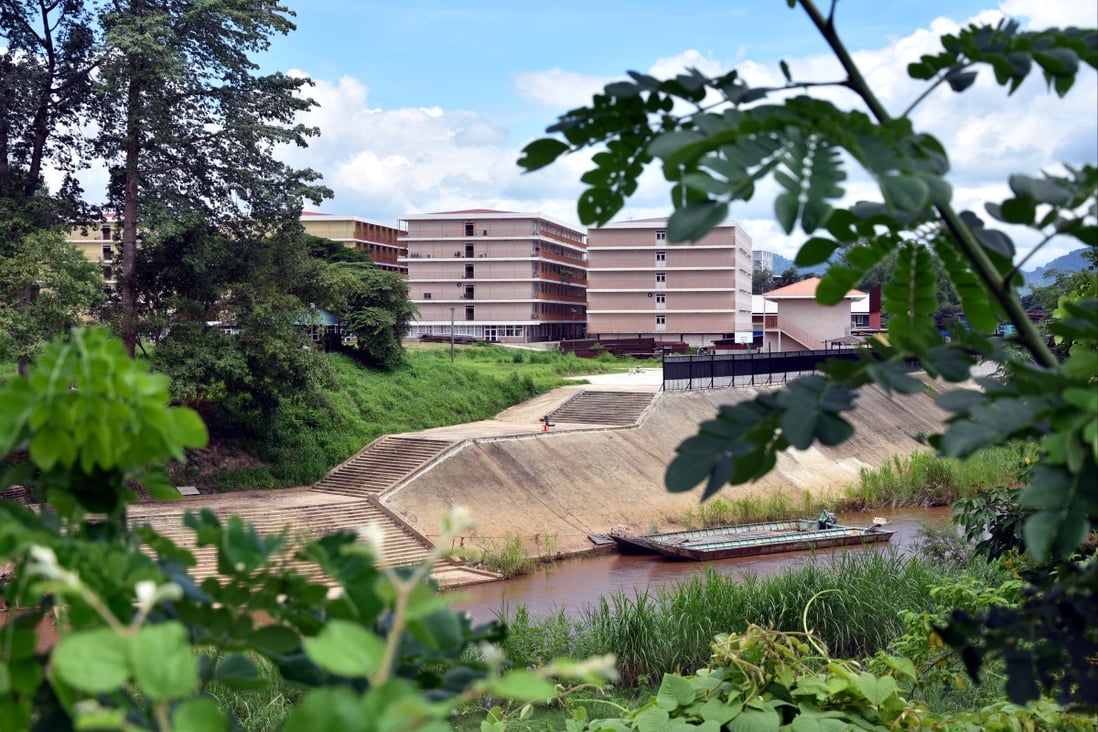
The dock at “Gate 25” north of Myanmar’s Myawaddy township. Even the eight victims who spoke to This Week in Asia about the severe physical abuse they endured inside the compound did not know its true name. Photo: Alastair McCready
This story was produced in partnership with the Pulitzer Center.
*The names of all the victims have been changed throughout and some details omitted to prevent identification.
“Run!” was the only instruction given to Filipinos Max and Jane, ending their six-month ordeal of forced online scamming in Myanmar.
A day into their freedom, sitting at a farmhouse on the outskirts of Mae Sot – the same Thai border town they were trafficked through late last year – the pair recalled their nervous final moments as a boat edged across a narrow neck of river towards safety.
Once on the Thai bank, their chaperones told them “all you need to do is run,” Jane said – so that’s what they did, luggage in hand. Max, still shaken from the experience, let Jane speak to This Week in Asia on his behalf.
They had arrived from the Philippines separately, in December and January, after answering adverts for well-paid jobs in Thailand.
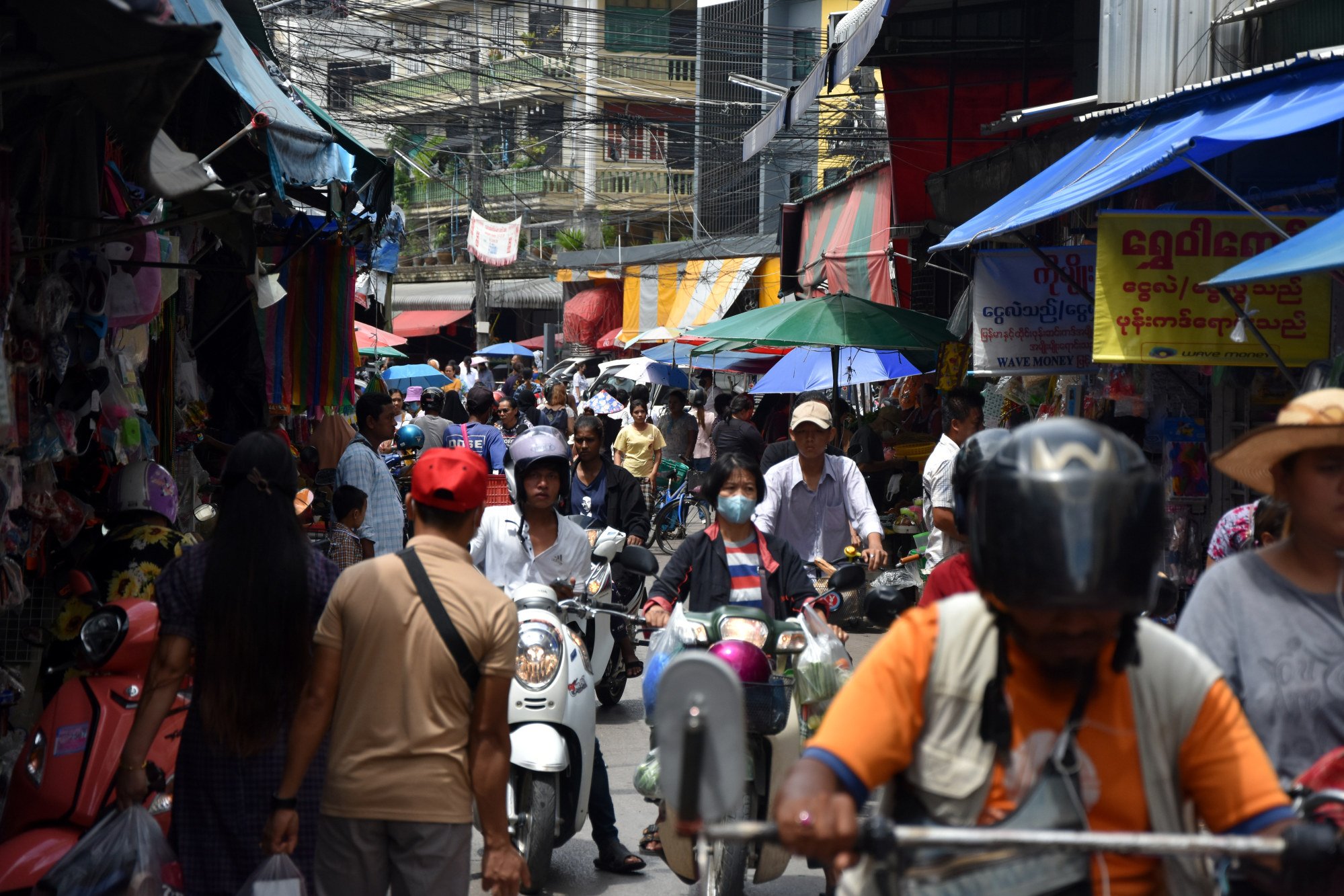
A busy market in Mae Sot on the Thailand-Myanmar border. Photo: Alastair McCready
But they were instead driven nearly 500km northwest to Mae Sot, taken across the narrow Moei River into Myanmar and forced to scam targets in Europe and North America from a compound operated by Chinese criminals.
By the time they left, they carried the scars and bruises from their bosses’ beatings – and the guilt from their actions.
“I became an instrument in scamming people, I worked for them … even if it [was] not my own choice,” Jane said.
EVERY MONDAY
The most pressing stories and in-depth analysis from the Asia region, sent to you each week.
GET THE NEWSLETTER
By registering, you agree to our T&C and Privacy Policy
Untold thousands have made the same journey – coaxed from Malaysia, Taiwan and Indonesia; India, Kenya and Nepal by promises of high-paying work – only to be trapped for months, or years, in a labyrinth of cyber scams.
‘Scam operations scaling up’: anti-trafficking NGO Global Alms chief Mechelle Moore
The ‘company’ Jane and Max say they were forced to work for is one of more than a dozen flourishing along a 40km stretch of river in Kayin state’s Myawaddy township, nodes in a vast Chinese-dominated scam network spanning Southeast Asia.Cambodia’s scam sector gained infamy last year after reports seeped out of massive human trafficking, forced labour and systematic torture. The Philippines’ role as a major scam hub was also reaffirmed in late June when a raid on a Chinese-run scam complex in southern Manila freed more than 2,700 people, while Laos is host to large-scale scam operations at the notorious Golden Triangle Special Economic Zone.
But in Myanmar, these brutal criminal enterprises continue unchecked. They are abetted by the country’s ongoing domestic turmoil, brought about by the 2021 military coup, and operated by alliances of Chinese criminals and a local paramilitary group, beyond the reach of outside law enforcement, civil society and the media.
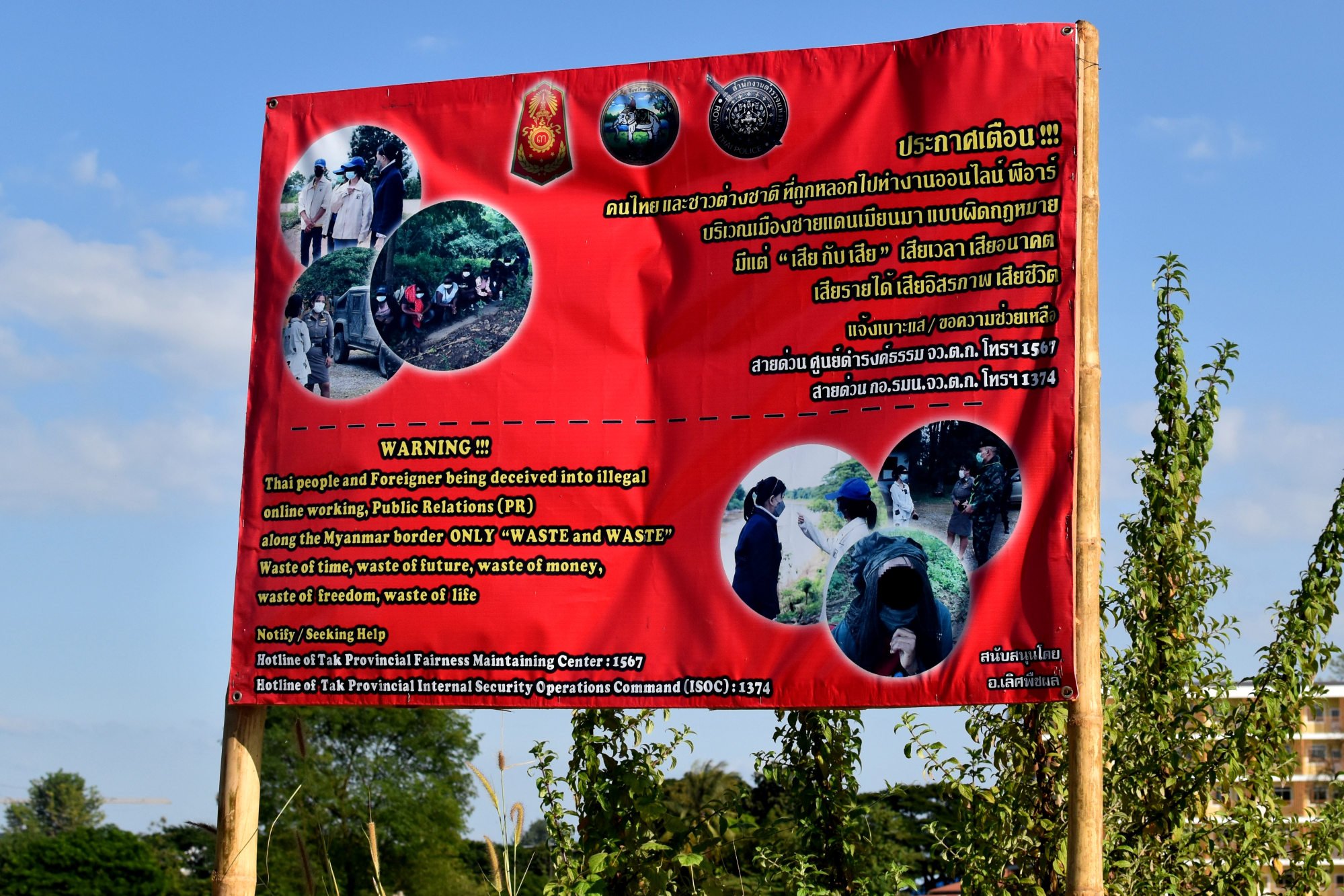
An anti-trafficking sign near the Thailand-Myanmar border warns potential victims not to be “deceived into illegal online working”. Photo: Allegra Mendelson
Investigating the crisis, This Week in Asia spoke with 18 former and current workers from seven countries, all of whom were trafficked to the Myawaddy area of Kayin state this year and last, where they were forced to scam; physically and psychologically abused; and prevented from leaving.
It’s the “United Nations of scamming”, said Jason Tower, Myanmar country director at conflict monitor the United States Institute of Peace (USIP). “You’ve got scammers who’ve been trafficked in as forced labour from all these different countries.”
If there’s more and more reports coming out about Chinese nationals involved in fraud … that’s going to be a loss of face for the Chinese governmentJason Tower, USIP Myanmar country director
To get in or out, most pass through the porous Thailand-Myanmar border. Geraldine Ansart, International Organization for Migration Chief of Mission in Thailand, said it had received “a huge number” of potential trafficking referrals since mid-2022. “We can assume it’s just the tip of the iceberg.”
The industry is thought to be worth billions, with the sums stolen paying for fake websites; recruiters who reel in new victims; and the corrupt officials who open up borders for those desperate for work.
Jane believed she was applying for a job at Amazon, a company she had previously worked for in the Philippines, corresponding with what appeared to be real company email addresses. Her recruiter took care of her flight bookings to Bangkok and within a matter of days, she was in a car driving to the river.
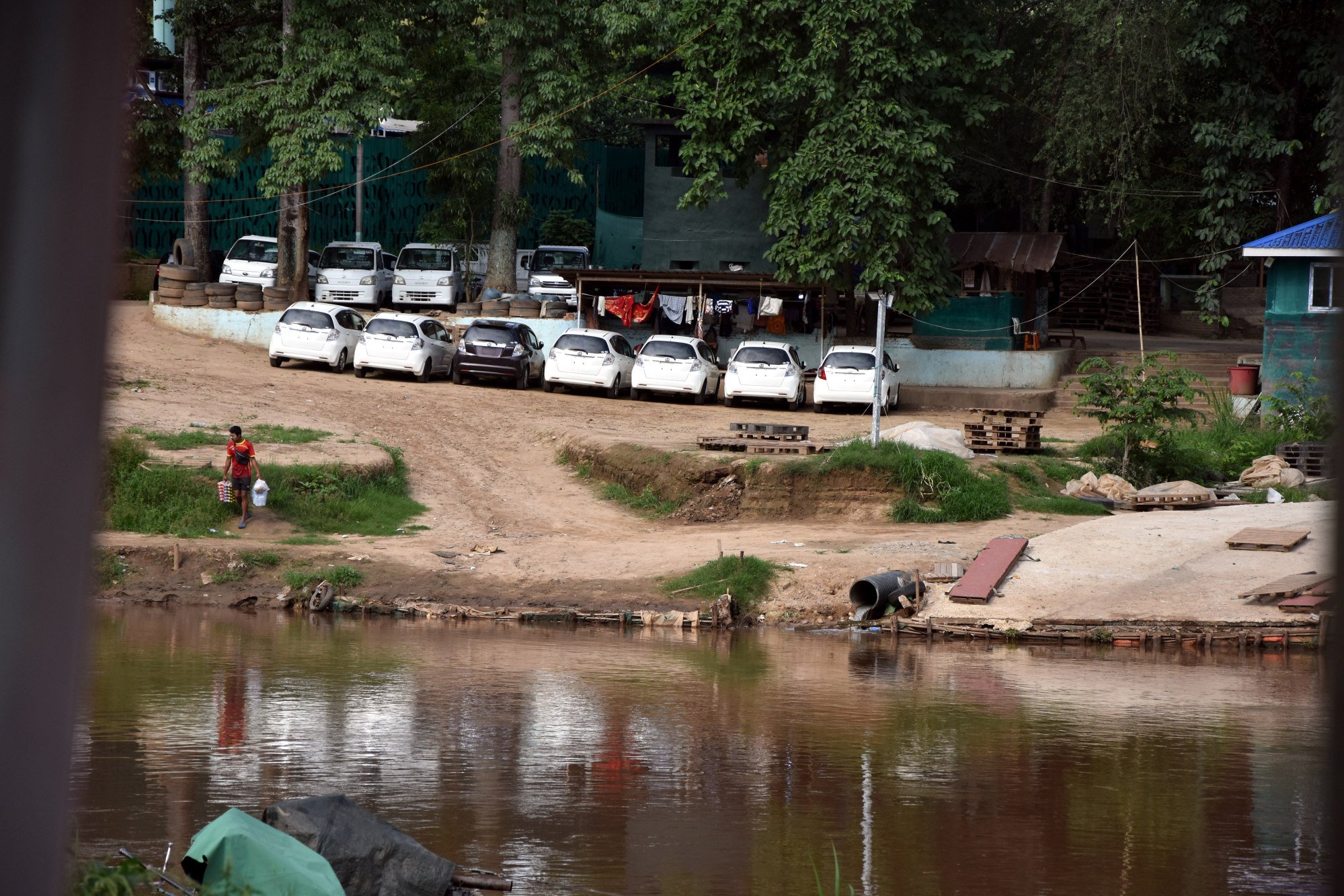
Smuggled cars await collection on the Myanmar bank of the Moei River, as seen from Thailand. Photo: Alastair McCready
KK Park
One Sunday morning on the Thai bank of the Moei River, a group of men put down their breakfast as a truck pulls in to unload its contents: boxes of nappies, chocolate wafers and bottles of bird’s nest drink into a boat below.Some of the goods are destined for a compound across the river in Myawaddy, which the men say is home to a “Chinese online gambling company” – a euphemism for scam operations.
The compound is called “Family Park”, according to three Indonesian men who were trapped there for five months earlier this year. There were around 2,000 workers inside, they said, perpetrating online scams and enduring severe physical abuse such as forced runs in the midday heat, beatings and electrocution.
“One time 20 of us were locked in a room, only getting food once a day … they [the guards] came and punched me, electrocuted me and beat me with a stick,” said Arif, one of the men.
Trafficking and ‘love scams’: inside a raided Chinese gaming firm in the Philippines
13 Jul 2023
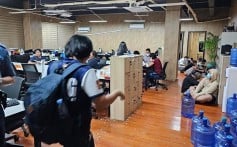
Though still expanding, Family Park is a small player among Myawaddy township’s many scam centres.As the river bends south, the notorious KK Park Zone comes into view on the Myanmar bank. It is a sprawling two-part complex, its wide red roofs synonymous with scams, smuggling and torture, and where rumours even swirl of organ trafficking.
KK Park has grown rapidly, with satellite images provided by Maxar Technologies indicating that phase one – known as KK I – was completed between late-2019 and mid-2021.
Its sister compound, called KK II – or Dong Feng by some victims – rose from an empty plot of land in April 2021 to become a sprawling site by March this year. A major new building is under construction at the site right now.
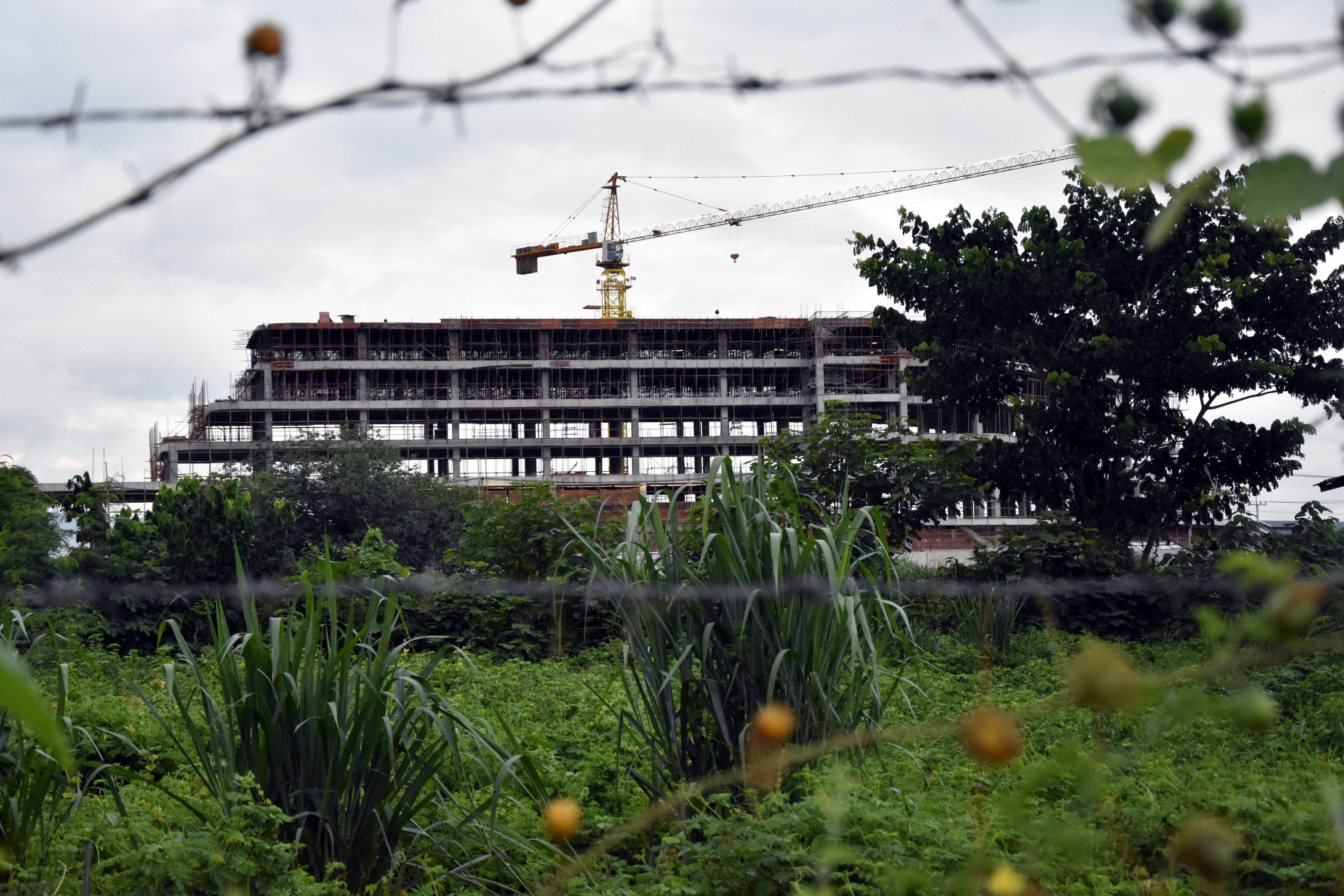
A new building is seen under construction at the KKII (Dong Feng) compound of KK Park in Myanmar on July 1. Photo: Alastair McCready
It was in a four-storey building in KK I that Jane and Max were forced to work as scammers, joining teams of up to 15 people working 12- to 14-hour shifts to meet targets of US$25,000 a day.
The pair say there were at least 300 other people in their office, organised into tasks such as finding victims, or “marks”, on social-media platforms and engaging them in scams.
Jane said the teams in her office would generally hit their targets using techniques such as the notorious ‘pig butchering’ scam, in which they posed as a love interest to entice the mark into a fraudulent investment scheme.
“[The bosses] think we are robots. You need to provide them with money. You need to provide them with sales … If not, severe punishment is waiting for you,” Jane said, pointing to the scars on her back from the beatings she suffered.
On some days, the teams pulled in up to US$200,000, she said, as the scams entered the ‘kill phase’: the endgame where the mark, enveloped in the con, pours in increasing amounts of money.
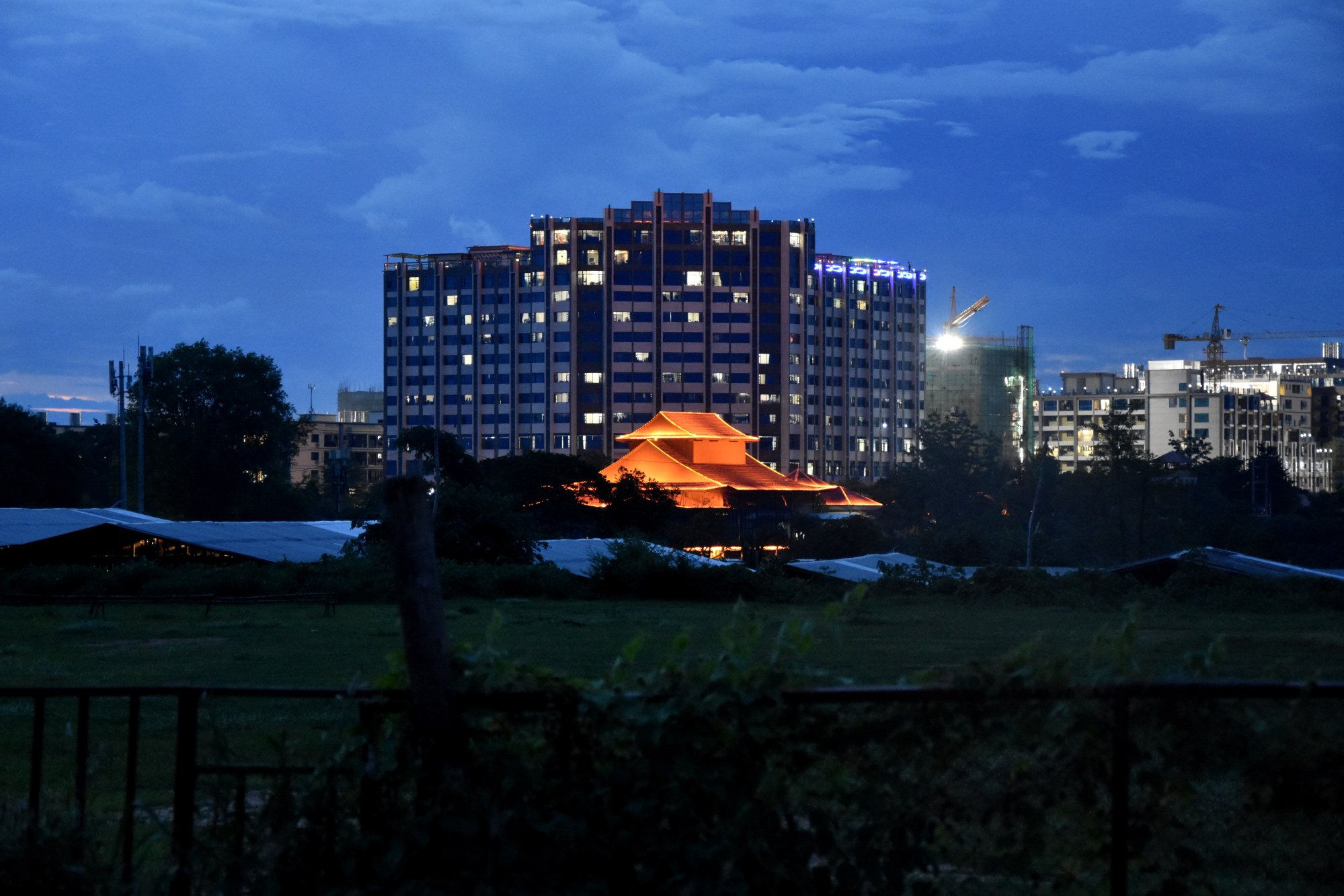
Buildings pictured on July 2 in Shwe Kokko, a small city of casinos, hotels and KTV rooms that experts says is ground zero of the Myanmar scam trade. Photo: Alastair McCready
Casinos, criminals and denials
Around 25km upriver lies what experts believe to be ground zero of the Myanmar scam trade: Shwe Kokko, a small city of casinos, hotels, KTV rooms and scam compounds.Shwe Kokko is in territory controlled by the Kayin Border Guard Force, a paramilitary group nominally under the command of the Myanmar military that’s led by Colonel Saw Chit Thu.
Once a small village nestled in a crook of the Moei, it started to grow in early 2017, when Chit Linn Myaing Co Ltd – the border guards’ holding company – and Hong Kong-registered Yatai International Holdings Group, chaired by She Zhijiang, began construction on a US$22.5 million development in the area.
Known as the Yatai Shwe Kokko Special Economic Zone, by 2019 the project had metastasised well beyond its concession. Revised Yatai IHG promotional materials show plans for a gleaming US$15 billion city with financial districts, industrial zones and luxury resorts.
‘Help us’: torture, death and the battle to escape Myanmar’s scam mills
24 Jul 2023

But in the expansion process She – a naturalised Cambodian who renounced his Chinese citizenship in 2019 – appears to have made powerful enemies in Beijing, where he is wanted for running illegal online gambling sites. In August last year he was arrested on an Interpol ‘red notice’ in Thailand, where he is believed to still be in custody contesting his extradition to China.Yatai IHG could not be reached for comment. But in a statement published by the Bangkok Post in May, the group denied any links to crimes, scams or KK Park, describing itself as “a professional enterprise” and calling She a “legitimate businessman”.
Shwe Kokko forms part of a latticework of Chinese-financed special economic zones across Laos, Cambodia and Myanmar, spin-offs loosely connected to Beijing’s belt and road ambitions for infrastructure and trade in the Mekong region.
Following Shwe Kokko’s lead, in late 2019 Chinese scam syndicates began acquiring plots of land along the Myanmar side of the Moei River. The military coup acted as an accelerant, analysts say, ending efforts by the elected then deposed government of Aung San Suu Kyi to put border areas under greater scrutiny.
While the precise number of scam workers along the Moei is difficult to quantify, USIP’s Tower estimates there are a minimum of 20,000 in Shwe Kokko and KK Park alone.
“Then you’ve got 17 more of these [compounds] spread along the river and they’re all able to accommodate at least a few thousand people,” he said.
Satellite images also show rapid development between April 2021 and March this year at the Huanya International City Project, a burgeoning “new town” south of Myawaddy, and Xinghua compound, where five former victims told This Week in Asia they were abused and held for months.
The Karen National Union (KNU), one of Myanmar’s oldest and largest ethnic armed groups, has also been linked to the Huanya project, with Roger Khin, the head of the group’s defence department, photographed at a groundbreaking ceremony in 2020.
KNU spokesman Padoh Saw Kalal Say denied any “individual participation of KNU leaders” and said he “strongly condemns the brutal acts and forced labour inside the compound”, telling This Week in Asia that a team had been formed to investigate the matter.
They told us: ‘We can kill you here. This is Myanmar’‘Jane’, Filipino trafficking victim
But while Shwe Kokko, KK Park and the Huanya city project are being subjected to growing scrutiny, most of the scam compounds along the Moei remain unknown, with only fragments of testimony from survivors or people still inside attesting to their existence.
One example is the Dongmei Zone – originally named the Saixigang (“surpass Sihanoukville”) Industrial Zone Project, in reference to the Chinese-dominated resort city in Cambodia. It is owned by Macau triad Wan Kuok-koi, better known as “Broken Tooth”, who was convicted for illegal gambling in 1999 and served 14 years in prison.
“Gate 25”, a compound just north of Myawaddy town, has also flown under the radar. Its true name remains unknown, even to the eight victims who told This Week in Asia about the severe physical abuse they endured inside.
Mechelle Moore, CEO for anti-trafficking NGO Global Alms in Mae Sot, has witnessed a surge in trafficking victims since receiving their first scam-related trafficking referral from Thai police in August last year.
“From there it snowballed,” she said. As of July, the organisation had helped no fewer than 452 people.
Though many are trafficked into Myanmar and held against their will, Moore said that some – even if initially unaware of the nature of the work – “stay because they are getting a salary … which is providing income for their families back home”.
Many of those trafficked into the compounds have no idea they are in Myanmar until it’s too late, survivors say. Once there, they are beyond the law, held captive by criminal gangs and their local military affiliates.
“They told us: ‘We can kill you here. This is Myanmar’,” Jane recalled.
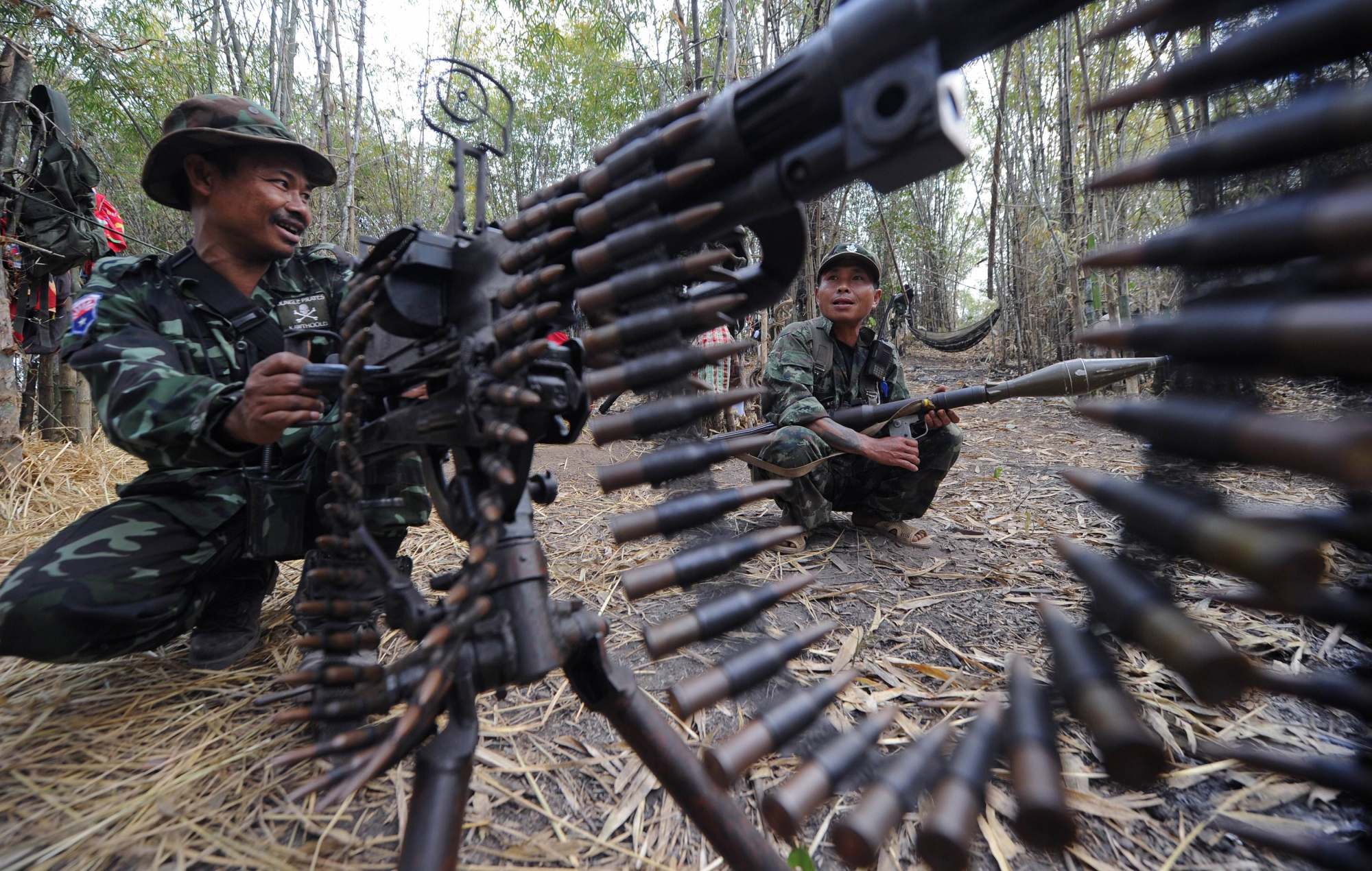
Members of the Karen National Union ethnic armed group stand guard with their weapons near the Myanmar-Thai border in 2012. A spokesman for the group denied that any of its leaders were involved in the scam centres. Photo: AFP
Beginning of the end?
While construction along the Moei continues, pressure is building on the scam compounds.Interpol issued its first global warning on “human trafficking-fuelled fraud” in June, the same month that the US State Department’s Trafficking in Persons 2023 report highlighted Thailand’s growing role as a “transit country” for people trafficked to Myanmar for “cyber scam operations” – a reputation Thai authorities likely don’t want, Tower said.
But most telling was a May statement from China’s Foreign Minister Qin Gang, calling on Myanmar authorities to crack down on cybercrime in its border areas.
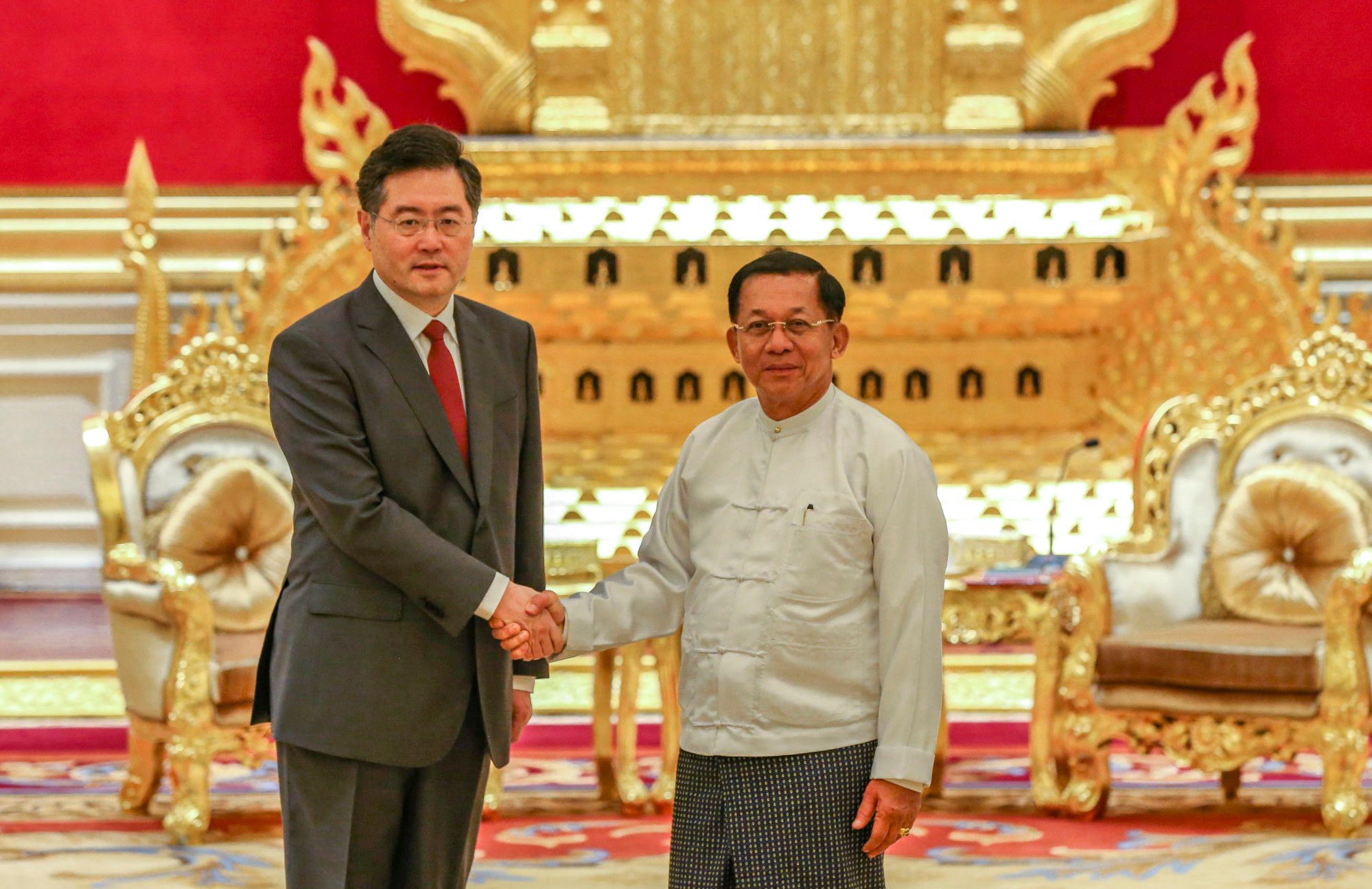
China’s Foreign Minister Qin Gang (left) shakes hands with Myanmar junta chief Min Aung Hlaing during a meeting in Naypyidaw on May 2. China remains one of the internationally isolated country’s few patrons post-coup. Photo: Xinhua
As one of the few remaining patrons of Myanmar’s internationally isolated junta, Beijing’s influence could prove crucial in taking down the scam centres, Tower believes.
On June 6, Thailand shut off electricity to Shwe Kokko, as well as the Lay Kay Kaw area that houses the entirety of KK Park. Much of the border area is supplied with internet and power by Thai-based companies.
While the blackout appears to have made a minimal impact on operations inside the zone, Tower believes it was pushed by Beijing as diplomatic pressure builds on the criminal syndicates.
Scam syndicates in Southeast Asia need to be shut down. Beijing can help
23 Aug 2022
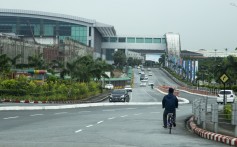
“If there’s more and more reports coming out about the trafficking of Chinese nationals and Chinese nationals involved in fraud … that’s going to be a loss of face for the Chinese government,” he said.But until something more is done, the scams will keep spewing out from Myanmar, as ranks of young people from across the world continue to cross the Moei.
“Leaving that hell makes you think that this is another opportunity for you,” Jane said. “God is there, he can hear our prayers.”
Additional reporting by Hein Thar, edited by Aidan Jones


